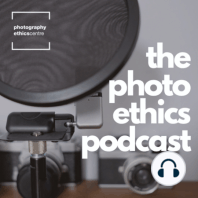40 min listen
The Other: On class in the industry
ratings:
Length:
64 minutes
Released:
May 26, 2021
Format:
Podcast episode
Description
In this episode, we talk with Kirsty Mackay, Kelly O’Brien, and Joanne Coates who are working class photographers, visual artists, storytellers, and founders of The Other. They talk about why and how they founded The Other, and the importance of fostering a supportive community. They discuss how they see the role of a photographer, the role of the photographed communities, and the power dynamic between the two. Providing examples from their own experiences, Kirsty, Kelly, and Joanne raise the issues facing working class people within the photography industry while suggesting possible solutions and calling for change. What you’ll find inside: “I think in my mind [the obstacles] are two fold. There are the obstacles that we have in our head. Things like imposter syndrome, things like a lack of confidence in middle class spaces. And then there are the obstacles within the photography industry. Some of those come from it being a middle class dominant space, so work of working class photographers is not valued in the same way. There’s the financial obstacles of the pay to play, so that’s paying to enter competitions, paying for portfolio reviews.” (9:40) (Kirsty)“I want to challenge the dominant visual discourses which are coming out, the dominant bodies of work that are coming out around working class communities which I find quite harmful. I find they’re misinformed. And that’s largely because the people who are making that work aren’t coming from those communities, and they don’t have a deeper understanding of what it’s like to be poor and working class. … I just feel like there needs to be a deeper education and knowledge when people are working with communities which aren’t theirs.” (16:40) (Kelly)“Photography’s always been very good at portraying victims and not as good at portraying the perpetrators. And if you are looking at poverty, for instance, through a middle class lens it’s easy to miss out a lot of the nuances and tell a very single sided story.” (17:35) (Kirsty)“My solution is to listen to people, and when I’m photographing people I’m not doing it from a vantage point of looking down on people. When I’m photographing people, I’m in awe of the people that I’m photographing and I’m learning from them and I’m listening to them.” (31:20) (Kirsty)“Different marginalised groups are often divided, so we need to have an alliance with other groups and other movements. And all understand each other. So that could be queer photographers, BIPOC photographers, women photographers, disabled photographers, non-binary photographers. All different people who have all different issues and to understand that together we’re stronger.” (38:45) (Joanne)“People need to let go of their power. And I think that’s the difficult one.” (40:00) (Kelly) “I think there’s a fine line of this saviour complex that we can experience. And even in my own communities when I’m working, I don’t believe that my photography is going to radically change the people’s lives that I’m working with. Because actually it’s bigger than me, and it’s bigger than the work. It’s systemic, problematic, Capitalist oppression. And the least we can do with our work, if it’s done well, is create important conversations.” (49:00) (Kelly) “If you have money, it’s easy to make money. And I know some photographers who boast about their funding applications and their success rate. And I think I would just love people to look at their privilege a little bit more.” (59:35) (Kirsty)“Arts Council England … is a system in place to make artists able to practice, and it’s continuously taken advantage of by using things like grant writers, but also people who think that they deserve it, which is often not working class people. … It’s really important to look at that specific funding body and to know that it is funded mainly by working people, and how ethical is that in your practice.” (59:50) (Joanne)What does photo ethics mean to The Other?Joanne: “I think, individually, ethics should b
Released:
May 26, 2021
Format:
Podcast episode
Titles in the series (49)
Martha Tadesse: On unlearning and learning ethics: A discussion of ethics and representation in humanitarian photography by The Photo Ethics Podcast
